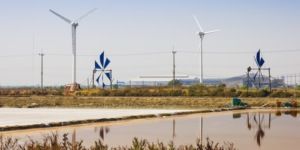News
DTU co-op with China could have massive CO2 emission impact
This article is more than 9 years old.
Project in keeping with China’s aim to convert 30 percent of its electricity production to wind energy by 2030

The whole world stands to benefit from China embracing wind energy (photo: DTU)
The Technical University of Denmark (DTU) has launched a massive co-operation with China in a bid to increase efficient usage of green wind energy available on the two countries’ power grids, which could potentially offer up considerable CO2 emission savings in the future.
The project, dubbed EPIMES, commenced on October 1 and will open the door over the next three years for more wind energy being made on the Danish and Chinese power grids.
“Converting 30 percent of China’s electricity production to wind energy by 2030 will reduce the global carbon footprint by 1.1 giga-tonnes a year. This corresponds to 3 percent of the world’s total carbon emissions in 2014,” said Henrik Binder, a researcher at DTU Elektro who is the manager of the Danish side of the project.
“The collaboration is giving DTU’s researchers a unique opportunity to test their models on a much larger scale. We expect to gain far more insight into along with several tools for explaining, how we can reshape and store wind power as gas and heating in Denmark.”
While research in Denmark is quite far advanced in terms of siphoning wind energy to the power grid, China is constructing huge wind turbines in the northern, eastern and western parts of the nation – it leads the world in installed wind energy capacity.
READ MORE: DTU spinout to help battle zika virus
A fusion of talent
The co-operation includes the top Chinese university Tsinghua, the Chinese energy authority, the nation’s largest energy company and Beijing’s local energy provider.
The Danes will be in charge of method and concept development in order to map solutions to the challenges associated with having a large and increasing share of energy from many individual energy sources working together on the power grid instead of energy coming from central power plants.
Meanwhile, the Chinese will be looking into how parts, such as heating pumps and fuel cells, can be manipulated to make the transformation of wind energy into gas and heating most effective and to ensure the wind energy can be optimally utilised in the multi-energy system.
“What is unique about this project is that we can test the solution in real-life situations,” said Binder.
“In doing so, we will find out how good our models are in practice, how close we are to storing wind energy as gas and heating in Denmark, and how we can do it in the best possible way.”










































